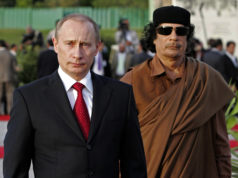Nearly two months after Tunisians overthrew President Zine al-Abidine Ben Ali, sparking unrest throughout the Middle East, the tiny North African country has witnessed positive changes. But Washington isn’t doing all it can to assist the country in its efforts to reform and it would be a mistake to forget about Tunisia.
On Monday, Tunisia’s ruling authorities appointed a new government free of ministers from the Ben Ali era and disbanded the former ruler’s security apparatus, known for its human rights abuses. The following day, a Tunisian court dissolved the former governing party of Ben Ali, the Rally for Constitutional Democracy (RCD), and liquidated its assets and funds.

Tunisian protesters |
Still, the situation in Tunisia remains fragile. According to a UN report issued late last month, the former ruling party or corrupt elite could easily reverse the gains. “Some elements in society, suspected to be loyal to former President Ben Ali, have sought to sow instability, to create chaos, and to discredit the peaceful demonstrations and calls for reform. Their activities continue to jeopardise the gains,” the report stated.
Moreover, according to J. Scott Carpenter, the U.S. has been slow to respond with material aid to the task of democratization and, as of the last week in February, no USAID funds had reached Tunis. Even harder to believe, the U.S. Department of State’s Middle East Partnership Initiative (MEPI) recently informed American NGOs in Tunisia that they may not receive MEPI aid in 2011 as Washington reviewed regional priorities.
This would be a grave mistake. Assisting Tunisia in its democratization efforts should be high on Washington’s list of foreign priorities, as a successful transition can create a friendly North African state, inspire other Arab nations, and stem Islamic extremism from filling the vacuum left with Ben Ali’s absence.





